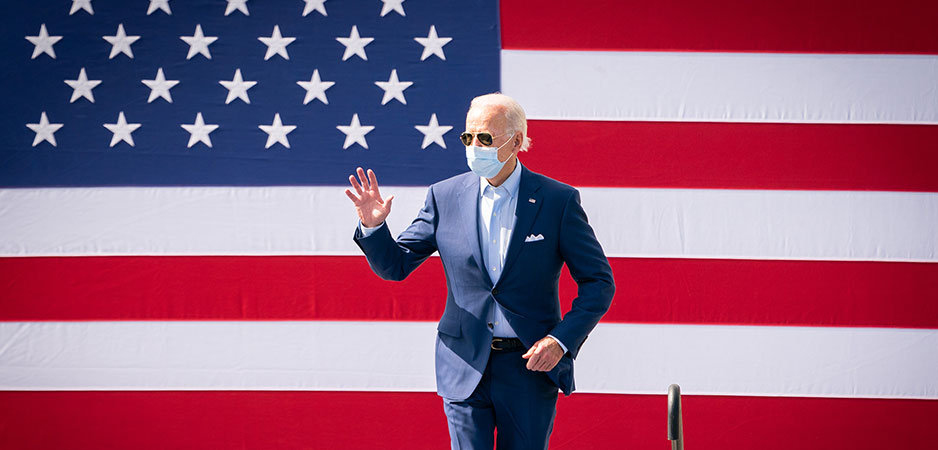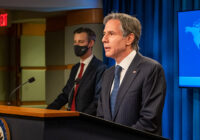Joe Biden was not elected for his positions on foreign policy and national security. Few US presidential candidates are. In his debates with outgoing President Donald Trump prior to the election, those issues were hardly discussed. So, the success or failure of the Biden presidency will not be determined by foreign policy.
For President-elect Biden and Vice President-elect Kamala Harris, domestic policy will dominate their time and efforts. Overcoming the coronavirus pandemic, ensuring that newly released vaccines are quickly and effectively administered, and righting a still stressed US economy will be their top priorities in the first year. It is what the American people want and expect. Furthermore, there is America’s worsening and more pernicious longer-term problems: increasing economic inequality, continuing racial injustice and growing political polarization.
Joe Biden and America’s Second Reconstruction
These will be profoundly difficult problems to address successfully, especially as President Biden could face a US Senate controlled by the Republican Party and a thinner Democratic Party majority in the House of Representatives.
First, Image Repair
Nevertheless, after four years of an unprecedentedly destructive foreign policy and simply by virtue of the fact he will lead still the world’s most powerful and wealthiest nation, Joe Biden cannot ignore foreign policy. In fact, amidst his formidable domestic challenges, he must confront serious foreign policy challenges vital to America’s interests and to those of its many friends and allies around the world.
We may already have caught a glimpse of how different Joe Biden’s foreign policy will be from Donald Trump’s, considering the first officials named to his senior foreign policy team: Antony Blinken as secretary of state, Linda Thomas-Greenfield as US ambassador to the UN with cabinet rank, Jake Sullivan as national security adviser, Avril Haines as director of National Intelligence and Katherine Tai as the US trade representative. They are all highly experienced, proven, knowledgeable, principled and committed public servants. Under President Trump, we saw few of those and many more self-interested, self-promoting political hacks and ideologues.
One of the first jobs Biden must tackle is America’s badly damaged reputation around the world. Donald Trump undermined critical alliances, pointlessly insulted and demeaned allies, abandoned international agreements and institutions, embraced autocrats and dictators from Russia to North Korea, discarded traditional free trade principles and turned America’s back on core values of human rights, democracy and rule of law. In short, it was a side of America no one had ever seen, certainly not in the history of the modern presidency. Most profoundly, it raised the question: Who is America?
Joe Biden must try to answer that question, and not just with the eloquent prose of President Barack Obama, under whom he served as vice president. The world expects and will demand to see concrete action, preferably guided by some overarching policy that can show to the world that the United States can still play — and indeed, must play — a leadership role again on the global stage.
There are some decisions that Joe Biden has indicated he will make right out of the starting block when he takes office on January 20. He will rejoin the Paris Climate Agreement and the World Health Organization. Those are relatively easy and straightforward but also very necessary. He is also likely to make clear in his inauguration address that America will return to be the leading voice for democracy, human rights and rule of law in the world, starting first at home but also unafraid to speak in their defense abroad.
Then begins the hard part. One priority he has made clear that his administration will take on immediately is reaffirming American membership in and commitment to its alliances and critical partnerships. These constitute America’s competitive advantage in global affairs and remain the heart of its still formidable soft power in the world. After Trump’s destructive practices, Biden will have to appeal to America’s allies in Europe, e.g., NATO and the EU, and in Asia and the Pacific, like Japan, South Korea, Australia and others. And he’ll have to do it with humility, understanding that under his predecessor, America seemingly abandoned principles that had previously united them all.
China: Work With Allies, Pursue Hard-nosed Diplomacy
China will be Joe Biden’s biggest challenge. On trade, defense, the South China Sea, Taiwan, cybersecurity, human rights and global leadership, China presents a daunting challenge. We should expect his administration to drive a hard bargain with Beijing but to use a very different approach than his predecessor. Pursued smartly, however, he may be surprised by the inherent advantages America still holds. For example, fortifying the alliances and partnerships as previously mentioned will aid his administration in addressing the China challenge. In fact, if he is to succeed on this account, he will need those allies and partners with him at the negotiating table. Another advantage: He will likely have bipartisan support in an otherwise partisan Congress for taking a strong position on China.
Trade is the clearest area where the US can capitalize on its extensive network of allies. China’s most important trading relationships — those with the EU and the East Asian nations — also happen to be America’s closest allies. The most effective approach will be one that joins their efforts with the administration to address China’s aggressive and predatory trade practices. Those range from intellectual property theft to intimidation and threats against foreign businesses to coopting confidential and proprietary techniques, practices and technology. But this approach works only if the new administration can establish that it can be trusted again, and not only on trade. If the US can succeed in its trade negotiations with China, it opens opportunities on other fronts.
The objective must be clear: The US isn’t interested in standing in China’s way as it progresses to superpower status. However, China must understand that it must do so within an international community governed by collaboratively set rules.
Renewed US Global Leadership: Climate and Global Health
Climate and global health are two other priority issues for Biden. He has indicated he will want not only to reestablish America’s commitment to them but also to take the lead. Rejoining the Paris accords won’t be enough. The US must marshal a critical mass of other nations in joining a reinvigorated effort to go beyond the mandates of Paris. In that, he’s likely to garner support from the EU and other developed nations. Appointing former Secretary of State John Kerry as his special envoy on climate change demonstrates Biden’s seriousness about the issue and the intention to take a much-needed lead role on this global existential challenge.
The COVID-19 pandemic raging at home makes it imperative that President-elect Biden make global health security a clear foreign policy priority. If there is one thing Americans have learned from the novel coronavirus, it’s that there is no greater threat to America’s national security and economic prosperity than another pandemic, especially one perhaps more catastrophic than COVID-19. If America is to be better prepared for the next pandemic, so must be the rest of the world.
As he did for climate, Biden may even wish to name a special envoy for global health to begin galvanizing America’s efforts and those of the rest of the world to prepare and coordinate global initiatives for preventing, containing and treating the next pandemic.
Climate and global health present the Biden administration with just the sort of challenge-cum-opportunity to which America was known to rise in the past. They are issues on which it is uniquely positioned to lead by virtue of its power, size, wealth and technological prowess. To reassume the mantle of global leadership, President-elect Biden must lead the global effort to combat climate change and strengthen the international community’s capacity to address pandemics.
In the Middle East, Iran and Then Everything Else
Unlike for the US administrations dating back to Jimmy Carter, the Middle East will not be a top-five priority in 2021. Americans have lost their appetite for inserting themselves into problems that the region’s residents cannot or will not work to resolve themselves. Biden and his foreign policy team recognize this, even as they know they can’t turn their backs on this dangerously volatile region.
But there remains one exception. Iran is a grave problem, perhaps less for the US than for Washington’s allies in the Middle East, most especially Israel and Saudi Arabia. It also constitutes a major challenge to America’s traditionally unflinching support for the Nonproliferation Treaty. Nothing could be more destabilizing in that region than the introduction of nuclear weapons. It will require almost immediate attention from President Biden.
The Trump administration’s policy of “maximum pressure” via its punishing sanctions has indeed inflicted enormous economic pain on Iran and its people. But it hasn’t changed Tehran’s behavior. Iran today has begun to reconstitute the nuclear program that had been effectively contained under the Joint Comprehensive Plan of Action (JCPOA), negotiated under President Obama in 2015 and then abandoned by Trump in 2018.
The purpose of the sanctions cannot be inflicting pain on the Iranian people, who are not responsible for their government’s policies. The objective of sanctions and an overall policy toward Iran must be to change its behavior. By that measurement, the Trump administration’s pressure campaign has not worked. Iran continues to: develop and build longer-range missiles; support malign behavior through the Islamic Revolutionary Guard Corps and its Shia proxies throughout the region, from Iraq and Yemen to Syria and Lebanon; senselessly threaten Israel; and deny the most basic human rights to its own citizens, most especially women, journalists, perceived political opponents and religious minorities.
Whatever trust President Obama and then-Secretary of State Kerry may have been able to build with the Iranians in reaching the JCPOA has been largely destroyed now. So, short of immediately rejoining that agreement, which would be unwise, face-to-face negotiations between Washington and Tehran will not be in the offing for at least one year.
In fact, to tackle the Iran question, Biden and Blinken must address the failures of the Obama approach. That will mean: (a) turning to America’s P5+1 partners — the UK, France and Germany — to work out a modus operandi for rejoining the JCPOA while simultaneously securing a commitment to negotiate a stronger JCPOA version 2.0; (b) consulting regularly and frequently with key regional allies to ensure their concerns and interests are addressed in any follow-on agreement with Tehran; and, most important, (c) including key congressional members in the negotiation process, at least on the Washington end. The last is most vital because the absence of Congressional support was ultimately Barack Obama and the agreement’s downfall. Any new accord negotiated must have the support of a majority of the Congress if it is to avoid the fate of the JCPOA, even it isn’t submitted for formal approval to the Congress. All of these are sine qua non for successfully addressing the Iranian challenge and securing a durable solution.
While the Iran portfolio remains an urgent priority for Joe Biden, it won’t be one resolved in his first year and perhaps not until well into his second. His administration and the Congress must understand that the US cannot not sanction, bomb, assassinate or otherwise forcibly compel Iran into complying with its norms for behavior. It will take patient, deliberate and determined diplomacy.
Can’t Ignore the Rest
These are likely to be President Biden’s top priorities. But they won’t be his only ones. His administration and the US also face serious challenges from a menacing and malign Russia, an arms control agreement with whom due to expire within weeks of his taking office; still extant terrorism and cybersecurity threats; a wave of autocrats with a full head of steam, from Turkey and Hungary to Venezuela and the Philippines; ill-behaved and irrationally aggressive regional actors vying for preeminence in the Middle East; continuing conflict and humanitarian crises in the Middle East, Africa and the Caucasus and elsewhere.
Joe Biden will be the most experienced and knowledgeable president on foreign policy since George H.W. Bush. As such, he surely knows that it is issues like these that can suddenly rise to crisis proportions and take over his foreign policy or even his presidency. So, they won’t be far from his attention. But a clear-eyed view of what is most important will drive Biden toward those highlighted above.
However, there is likely to be a critically important domestic component of the Biden foreign policy agenda. This gets to the Achilles heel of previous administrations’ foreign policies that Donald Trump cleverly exploited. Biden and his administration must be able to convincingly articulate to the American people a foreign policy that they will see as in their interests. That will mean a policy that protects American jobs, addresses threats to climate and the environment, ensures security and offers a promise of a better future.
Crafting a policy that meets these criteria may be Joe Biden’s biggest challenge, especially in view of the historic disconnect between foreign policy and the American people and polarization of the American public exacerbated by four years of Donald Trump. But if this administration is to be successful in confronting and capitalizing on America’s many challenges abroad, it must be able to show that it holds the interests of Americans uppermost — and that they stand behind this policy.
The views expressed in this article are the author’s own and do not necessarily reflect Fair Observer’s editorial policy.
Support Fair Observer
We rely on your support for our independence, diversity and quality.
For more than 10 years, Fair Observer has been free, fair and independent. No billionaire owns us, no advertisers control us. We are a reader-supported nonprofit. Unlike many other publications, we keep our content free for readers regardless of where they live or whether they can afford to pay. We have no paywalls and no ads.
In the post-truth era of fake news, echo chambers and filter bubbles, we publish a plurality of perspectives from around the world. Anyone can publish with us, but everyone goes through a rigorous editorial process. So, you get fact-checked, well-reasoned content instead of noise.
We publish 2,500+ voices from 90+ countries. We also conduct education and training programs
on subjects ranging from digital media and journalism to writing and critical thinking. This
doesn’t come cheap. Servers, editors, trainers and web developers cost
money.
Please consider supporting us on a regular basis as a recurring donor or a
sustaining member.
Will you support FO’s journalism?
We rely on your support for our independence, diversity and quality.






